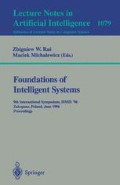Abstract
We present a formalization of fuzzy logic based on Zadeh's implication operator a→b=max{1-a, b}. Our logical system allows the specification of both lower and upper bounds of the truth value of a formula. We present a specific system of axioms and inference rules which are both sound and complete. We also provide a generalization of the classical resolution method which acts as a decision procedure in a finite fuzzy theory.
Work supported in part by NSF Grant IRI-9409370 and LEQSF Grant LEQSF(RF/1995–97)-RD-A-37.
Preview
Unable to display preview. Download preview PDF.
References
Ackermann, R., An Introduction to many-valued logics, Dover Pub. Inc., New York, 1967.
Dubois, D., Lang, J., and Prade, H., Fuzzy sets in approximate reasoning (Part 1: inference with possibility, and Part 2: logical approaches) distributions, Fuzzy Sets and Systems, 40(1991), pp. 141–202, 203–244.
Goguen, J.A., The logic of inexact concepts, Synthese, 19(1968), pp. 325–373.
Gottwald, S., Fuzzy propositional logics, Fuzzy Sets and Systems, 3(1980), pp. 181–192.
Kundu, S. An improved method for fuzzy-inferencing using Zadeh's implication operator, Proceedings of IJCAL Workshop on Fuzzy Logic in AI, Aug. 1995, Montreal, Canada.
Kundu, S. and Chen, J., Fuzzy logic or Lukasiewicz's logic: a clarification, Proc. 8th Intern. Symp. for Methodologies for Intelligent Systems, ISMIS-94, Charlotte, NC. (Oct. 16–19, 1994), pp. 56–64.
Lee, R.C.T., Fuzzy logic and the resolution principle, J. Assoc. of Computing Mach., 19(1), 1972, pp. 109–119.
Lu, J.J., Murray, N.V., and Rosenthal, E., Signed formulas and fuzzy operator logics, Proc. 8th Intern. Symp. for Methodologies for Intelligent Systems, ISMIS-94, Charlotte, NC. (Oct. 16–19, 1994), pp. 75–84.
Novak, V., On the syntactico-semantical completeness of first-order fuzzy logic. Part 1, 2, Kybernetika, 26(1) (1990) 47–66; (2) (1990) 134–154.
Pavelka, J., On fuzzy logic I, II, III, Zeitsch. Math. Logik, 25(1979), pp. 45–52, 119–134, 447–464.
Author information
Authors and Affiliations
Editor information
Rights and permissions
Copyright information
© 1996 Springer-Verlag Berlin Heidelberg
About this paper
Cite this paper
Chen, J., Kundu, S. (1996). A sound and complete fuzzy logic system using Zadeh's implication operator. In: Raś, Z.W., Michalewicz, M. (eds) Foundations of Intelligent Systems. ISMIS 1996. Lecture Notes in Computer Science, vol 1079. Springer, Berlin, Heidelberg. https://doi.org/10.1007/3-540-61286-6_148
Download citation
DOI: https://doi.org/10.1007/3-540-61286-6_148
Published:
Publisher Name: Springer, Berlin, Heidelberg
Print ISBN: 978-3-540-61286-5
Online ISBN: 978-3-540-68440-4
eBook Packages: Springer Book Archive

